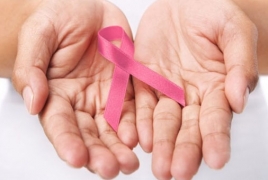Most mutations in cancer are random cell division mistakes: study March 24, 2017 - 12:30 AMT PanARMENIAN.Net - What causes cancer? A new study published Thursday, March 23 suggests that cells make random mistakes while dividing, accounting for most of the mutations in tumors, rather than family history or environmental factors, AFP reports. The report in the journal Science was authored by the same team that led a controversial study in January 2015 that said random DNA mutations, or in other words just "bad luck," is often to blame for cancer. This time, they expanded their mathematical model based on DNA sequencing and epidemiologic data to 69 countries worldwide. "Two-thirds of the mutations that occur in cancers are due to the mistakes that cells make when they divide," co-author Bert Vogelstein, co-director of the Ludwig Center at the Johns Hopkins University Kimmel Cancer Center, said at a news conference. Environment is a factor in 29 percent of the mutations in cancer, while heredity accounts for five percent, according to the study. "Every time a perfectly normal cell divides it makes several mistakes -- mutations," Vogelstein said. "Most of the time these mutations don't do any harm," he added. "That is the usual situation and that is 'good luck' in our paraphrase. But occasionally they occur in a cancer-driver gene. That is 'bad luck,'" he said. The goal of the study was to better understand these mutations so that better ways of detecting cancer early can be developed. The study also shines a spotlight on cancers that will occur no matter how perfect the environment, and may alleviate the guilt some patients face when they are diagnosed. "These copying mistakes are a potent source of cancer mutations that historically have been scientifically undervalued," said co-author Cristian Tomasetti, assistant professor of biostatistics at the Johns Hopkins Kimmel Cancer Center. However, he still urged people to avoid known risk factors for cancer, such as smoking and too much sun exposure. "We need to continue to encourage people to avoid environmental agents and lifestyles that increase their risk of developing cancer mutations," he said. Vogelstein concurred, stressing that the latest research is "in perfect accord with epidemiological estimates that 42 percent of cancers can be prevented -- and everyone should adhere to those prevention guidelines." Their earlier study, based on US patients, stoked debate in the scientific community. Critics said people might read it and believe they need not care about their diets or protect themselves from the sun if cancer were so often inevitable and unpreventable. A study in Nature in December 2015, almost a year afterward, countered that most cases of cancer were in fact caused by environmental factors, whether from smoking or exposure to ultraviolet radiation -- and not by random mutations. But the debate is far from settled, and scientists have continued to point to flaws in the research on both sides. Authorities said a total of 192 Azerbaijani troops were killed and 511 were wounded during Azerbaijan’s offensive. In 2023, the Azerbaijani government will increase the country’s defense budget by more than 1.1 billion manats ($650 million). The bill, published on Monday, is designed to "eliminate the shortcomings of an unreasonably broad interpretation of the key concept of "compatriot". The earthquake caused a temporary blackout, damaged many buildings and closed a number of rural roads. Partner news |